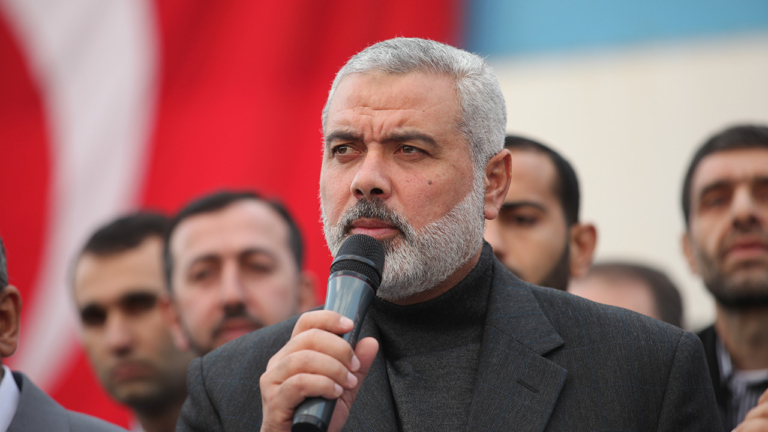
The end of July 2024 appears to bring serious deterioration in Middle East security and an assured rise in chances for all-out war following Israeli decisions to strike a Hezbollah senior commander in Beirut and to assassinate Hamas political leader Ismail Haniyeh in Tehran. Both actions are examples of unwarranted Israeli escalation that points to a decision by Prime Minister Benjamin Netanyahu and his rightwing government that most likely ends all attempts at negotiated settlements with Hamas, Hezbollah, and Iran. Indeed, deciding to escalate and push the Middle East to a region-wide conflict only confirms that Israel will do what will serve its Zionist project of domination at the expense of all the peoples of the region.
Reactions to the Israeli attacks against Hezbollah and Hamas’s Haniyeh have run the gamut of both approval and denunciation. As of this writing, there has been no specific counter actions by the two organizations; but this may change in a fashion that fuels speculation and expectation of all-out war. Hezbollah has rejected Israel’s claim that the party was responsible for a rocket attack in the occupied Syrian Golan Heights in which 12 children were killed, and has threatened retaliation if attacked as the perpetrator. Hamas also has vowed to avenge Haniyeh’s killing. How things develop over the next few days is anyone’s guess, but it is not hard to surmise that what prevailed between Hezbollah and Israel on the Lebanese-Israeli border is likely to become worse while Hamas may choose to take the war against Israel to new heights that threaten Israel’s domestic front.
Arab Center Washington DC (ACW) asked its analysts to provide their perspectives on the implications of the latest developments on Israel, Gaza ceasefire negotiations, Palestinian reconciliation, Lebanon, and the United States. Their views are below.
Ismail Haniyeh’s Assassination Intended to Stop Palestinian Reconciliation
Hanna Alshaikh, ACW Palestine Project Coordinator
In the week before Ismail Haniyeh’s assassination, leaders of fourteen Palestinian factions, including Hamas and Fateh, traveled to Beijing, where they agreed on national reconciliation terms, emphasizing Palestinian governance over Gaza, the need for an immediate ceasefire, and rejection of questionable “day-after” schemes. The Beijing Declaration called for Palestinian unity under an interim consensus government, holding elections, and unity under the aegis of the Palestinian Liberation Organization (PLO).
To understand the prospects of national reconciliation now, it is important to consider some aspects of Haniyeh’s political legacy. His imprint was evident through his roles as a skilled negotiator, the first prime minister of the thwarted Palestinian Unity Government of 2007, as a representative on diplomatic tours from Morocco to Russia, and as a leader with the unique experience of leading both Hamas’s Gaza-based and external leadership. Haniyeh led the ongoing ceasefire negotiations and participated in high-level talks with Fatah Deputy Chairman Mahmoud Al-Aloul, which culminated in the Beijing Declaration.
Israel’s violations of international law have come full circle today. Born in Gaza’s Shati Refugee Camp to a refugee family from Majdal Asqalan, Palestine, Haniyeh led factions to a historic unity agreement in his home in the Shati Camp in April 2014. Netanyahu opposed that agreement and sabotaged it by provoking the 2014 war for the same reason that Israel assassinated Haniyeh this week: Israel refuses to negotiate with a united Palestinian body politic and will escalate militarily to preempt effective Palestinian diplomacy. Killing Haniyeh now is not only a provocation to Iran and an assault on Hamas, but it also represents an attempt to eliminate Haniyeh’s legacy and disrupt his conciliatory and diplomatic efforts.
The assassination of Ismail Haniyeh will likely strain Palestinian unity efforts, seal the fate of ceasefire negotiations, and spark high-level regional war. It will not, however, disrupt Hamas’s diplomatic efforts or its commitment to national unity. Hamas has demonstrated that assassinations are mere spectacles, failing to weaken the movement, as its established internal and external leadership structures are designed to withstand such events. By preparing successors early, Hamas ensures continuity despite losses. Although Haniyeh’s assassination is a significant loss to the movement, it is unlikely to disrupt Hamas’s institutionalized decision-making processes and political strategies.
The Lebanon and Iranian Angles of Israel’s Escalation
Imad K. Harb, ACW Director of Research and Analysis
It was no small feat for Israel to target Fuad Shukr, Hezbollah’s military chief and close confidante of the party’s general Secretary, Hassan Nasrallah, in Beirut’s southern suburb of Haret Hreik. Confirmation of Shukr’s death should cause serious doubts about Hezbollah’s security arrangements and raise alarm about Israel’s ability to reach Nasrallah himself. The operation was conducted by a drone, prompting speculation about how Israel knew where to send the unmanned aerial vehicle to do the killing. Haniyeh’s assassination in Tehran raises the same questions about Iranian security, especially that the Hamas leader was in the Iranian capital to attend President Masoud Pezeshkian’s inauguration and was staying at what one would imagine would be a well-protected venue. In operational terms, both killings are extraordinary examples of security failure at a time of known and obvious threats from a rightwing Israeli government uncaring about whatever repercussions arise from its unwarranted escalation.
Hezbollah is unlikely to let Shukr’s assassination go unpunished and will most assuredly respond by increasing its attacks and their ferocity on Israeli targets across the Lebanese-Israeli border, or even choosing to strike deeper inside Israel. The party’s position that its attacks on Israel will not cease until the latter stops its war on Gaza will be further asserted now that Israel’s war has claimed the life of Hamas’s Ismail Haniyeh. Indeed, if the party did not end its skirmishes with Israel following the latter’s killing of some 400 of its members and destruction of border villages, it will not cease its operations after the killing of its military chief.
As for Iran, Haniyeh’s assassination will make new President Pezeshkian’s options harder to manage, as he navigates the start of his term amid clamors by Iranian hardliners to continue Iran’s resistance strategy against Israel and its international supporters. His reformist agenda for domestic affairs and openness to a new chapter with the United States and the West will most assuredly be stymied, resulting, predictably and unfortunately, in a lame duck presidency before he even begins to take the reins of his office. On the other hand, Iran is not likely to avenge its wounded pride or Haniyeh’s assassination by sending hundreds of missiles and drones to strike Israel like it did last April following Israel’s attack on its diplomatic mission in the Syrian capital Damascus.
The Shukr and Haniyeh Assassinations: Implications for Israel
Khalil E. Jahshan, ACW Executive Director
Israel’s assassination of Hezbollah senior commander Fuad Shukr in a drone attack in Beirut, followed within twenty-four hours by the killing in Tehran of Ismail Haniyeh, chair of the Hamas political bureau, represents a significant escalation and territorial expansion in the ongoing war waged by Israel against Gaza since October 7, 2023. Although the investigation of both events is still in its preliminary stage, the political implications for Israel are quite clear.
First, by resorting to targeted acts of political assassination carried out by government agents or agencies, the state of Israel is stirring up a hornets’ nest that has the potential to come back and haunt it in the future, as it did in past instances in history that led to regional confrontations and wars. After all, Israel itself is not immune to political assassinations and by engaging in such illegal and ill-advised activities it might be opening a Pandora’s box that most Israelis, including intelligence and military officials, would prefer to avoid in the future.
Second, the killing of Shukr and Haniyeh exacerbates Israel’s declared goals in this war. As articulated recently by Netanyahu, Israel still aims at containing the Lebanese front with Hezbollah, destroying Hamas’s military capabilities, and degrading its potential to govern in Gaza or elsewhere. Israeli policies, including targeted assassinations, will make these objectives significantly harder to achieve.
Finally, during his recent visit to Washington, Netanyahu was urged by his American interlocutors from both sides of the aisle, to finish the job faster and get the hostages back. His foolish steps in Beirut and Tehran will not “finish up the war,” will multiply the number of enemies to face simultaneously, and will potentially harm US interests in the region by dragging American forces into the expanded fighting about which Secretary of Defense Lloyd Austin III warned today if Israel were to face attacks in response to its targeted assassinations.
Assassinating Hamas’s Chief Negotiator Likely Ends Ceasefire Talks
Tamara Kharroub, ACW Deputy Executive Director and Senior Fellow
The assassination of Ismail Haniyeh, the Head of Hamas’s Political Bureau, in Iran is a two-fold declaration of escalation by Israel. The scale of this attack both taking place in central Tehran and targeting a senior Hamas leader and negotiator will be a game-changer and will have significant military and political ramifications. Not only will this further risk an all-out regional war and trigger retaliations, especially following the Israeli strike in Beirut, but it will also threaten any prospects for reaching a ceasefire deal in the war on Gaza.
Ismail Haniyeh is the head of Hamas’s political operations and has been serving as the primary interlocutor in the negotiations for a ceasefire and hostage release deal between Hamas and Israel, brokered by Qatar, the United States, and Egypt. While ceasefire negotiations have been fragile, the parties had been the closest to reaching a deal prior to the assassination, especially considering the recent progress on intra-Palestinian reconciliation in Beijing. Moreover, Haniyeh was considered the most likely Hamas leader to broker a deal as he was widely viewed as a moderate and pragmatic figure and enjoyed good regional relations. The assassination of the principal negotiator of one side, in the middle of negotiation efforts, effectively ends any prospects for an imminent ceasefire agreement.
Qatari and Egyptian officials questioned the future of the negotiating process and suggested that Haniyeh’s assassination would jeopardize efforts to reach a deal, while the United States maintained that a deal remains viable. Qatari Prime Minister Mohammed bin Abdulrahman Al Thani said that “political assassinations and continued targeting of civilians in Gaza while talks continue leads us to ask, how can mediation succeed when one party assassinates the negotiator on the other side?” US Secretary of State Antony Blinken and White House National Security Council communications adviser John Kirby both downplayed the impact of the assassination on the ceasefire negotiations and stressed the importance of continuing efforts to secure a deal.
However, the prospects for a truce and an end to the war are even more remote now as both Hamas and Iran vow revenge, and as Netanyahu’s government has shown it has no interest in peace or a resolution for the conflict. Adding to the mix President Joe Biden’s health and cognitive state, it is difficult to see how the negotiating process could survive. Many questions remain about the scale and scope of the responses by Hamas and Iran and its proxies, Haniyeh’s successor, and Hamas’s openness to negotiations after this, Netanyahu’s political future, and the Biden’s administration’s ability and willingness to exert influence. But what is clear is that Netanyahu’s plan to engage the United States in a regional war moves forward and the genocide in Gaza continues with no end in sight.
Netanyahu Is Coaxing the US into War with Iran.
Yousef Munayyer, ACW Head of Palestine/Israel Program and Senior Fellow
If there is one thing at which Benjamin Netanyahu has honed his skills it is reading the American domestic political scene. In fact, he probably reads American politics better than Israeli politics. Right now, he sees a lame duck president and a potential Democratic nominee who will be attacked relentlessly by his allies on the American right if they back away from blank check support for Israel. On his end in Israel, Netanyahu has survived until the end of July and the Knesset recess for three months, plus a legally mandated 90-day minimum election period, if early elections were forced on him, which means that his government will survive into 2025 and, importantly, past the November elections. This means that between now and November he perceives maximum leeway to do as he pleases in the region.
The dual assassinations in Beirut and Tehran come right after Netanyahu’s address to Congress and his meetings at the White House. The entire region will assume the strikes were carried out with American blessings. While Washington has said it was not informed about the strike that killed Haniyeh, it has not condemned it either or called on Israel to stop escalatory strikes.
Netanyahu’s perceiving zero restraints from now until November is extremely dangerous. Iran, favoring the longer-term view, has preferred to take tactical hits in the short term to watch Israel, and in turn the United States, bog down in a strategic and costly morass. Netanyahu wants to escalate to avoid an accounting for October 7 and the failures of his genocidal campaign in Gaza.
While the equilibrium has held for ten bloody months and been largely limited to Gaza, every additional strike tests Iranian patience and seems particularly designed to do so. It is not clear how much longer this dynamic will remain in place before collapsing into a larger and even more destructive regional war. Washington needs to decide if it is going to allow Netanyahu to wag them into a direct war with Iran. Given the opportunity, he will undoubtedly try, and this is not something that can wait for the election to figure out.
Featured image credit: Shutterstock/Sadik Gulec





